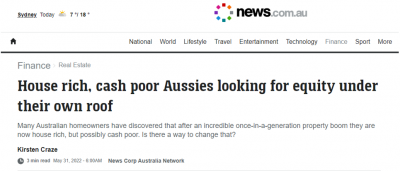If you would like to receive weekly updates like this, sign up here.
I recently read a term I’ve not heard for quite a while now.
Is it just coincidence that one only hears it bandied around during certain times of the real estate cycle?
Maybe it’s just me.
Anyway, here it is below.
 Source: News Corp Australia Network
Source: News Corp Australia Network
“House rich, cash poor.”
People who are wealthy in terms of the value of their home but not in the amount of cash in their bank account. Am I supposed to feel sorry for such people? You never really know what the motive is behind such headlines.
But there’s something else being intimated here. You almost need to be able to read between the lines to see it.
And if you find you are in the same boat, regardless of where you live, it’s imperative that you interpret what’s not said in this article, and fast.
If you do not, then the term “House rich, cash poor” will see you instead at risk of being “poor and indebted.”
Let me explain.
Addition by subtraction.
This does not just apply to Australia. This is a trend that’s occurring right across the developed world today.
Simply because it’s driven by behavior.
We humans are complex creatures, and yet in many ways we’re quite simple too.
We like to have our cake and eat it too.
In many respects, we are encouraged to do it. And nothing encourages this behavior more than property.
Anyway, here’s the ‘apparent’ problem we are dealing with here as stated in the above article.
Many Australian homeowners have discovered that after an incredible once-in-a-generation property boom they are now house rich, but possibly cash poor.
Last year national housing values skyrocketed by 22.2 per cent, adding approximately $126,700 to the median value of an Australian home.
And that’s money in the bank – well, sort of. While the increased value of your home means there is more equity under your roof, accessing that money isn’t exactly straightforward. Cashing in on that new-found wealth is becoming costlier.
So, whatever happened to a house being, you know, a place of shelter?
Imagine for a moment what the article would be if housing values had been negative? Would I be encouraged to move out instead?
Oh no, Darren, you can’t stay in your home…. it’s losing money! Run away!
Ridiculous, eh? But I digress.
So why exactly would accessing this newfound equity in your own abode be more costly?
This next part I do get and do have sympathy for those who find themselves in this situation.
Emphasis in bold is my own.
Property prices have grown exponentially over the last 20 years. Back then the price points were so much lower. If you sold a property, you were spending a much smaller percentage of it on real estate commission. Now, with the average dwelling price in many places, you’re looking at a $30,000 commission…
If you want to downsize, it’s going to cost you a small fortune in real estate commission to get out of the property and then another small fortune in stamp duty to get into a new one. So, downsizing can be an expensive exercise.
True, commissions to both sell and conveyancing costs to buy are simply part of the game.
You sell your home for a higher price than what you paid; however, your next house is also much higher priced than before and thus the fees involved are also going to be higher to complete the sale and purchase.
Annoying, but necessary. Stamp duty, however, is pure government money grabbing.
It’s a real and significant impediment to people trying to downsize or simply move into another property.
Nothing signifies just how broken the tax system is more than stamp duty.
Nonetheless, whether you agree that these costs are fair or not, they do end up taking a heap away from what is the point of the exercise, which is to release and capture that equity for yourself.
It begs the question – is there another easier way to do it?
This is what determines how big the bust will be.
Ok, so you’ve got your cake: I suppose you’d like to eat it now?
Fine.
There is indeed another way to do this, and one that mostly avoids all the above costs.
You refinance your property.
This allows you the luxury of keeping the property yourself whilst unlocking most of your newfound equity.
You can still live in the property, or you can rent it out and use the equity as a down payment on your new home or go on a worldwide travel expedition. The choice is entirely yours.
It’s that choice which refinancing can give you that makes it so attractive.
The equation is you first need those gains to manifest as additional equity above what it cost to purchase then find a bank willing to refinance you on suitable terms.
What’s interesting is, as the 18.6-year Real Estate Cycle moves through the second half, those terms of finance get much easier. As banks worldwide fight each other to gain ever more market share they will allow you to drive a hard bargain to get your business.
But you’re slowly walking into a trap.
Whether you are a downsizer or just want access to much needed cash, it makes little sense to incur all those additional costs that comes with selling and then buying.
Plus, that smaller home you may have had your eye on at the start of the year has just increased in price by 20% in six months!
Time is money.
But what’s your financial position when time is up? That’s right, the current real estate cycle only has a few years left of outsized growth left before land simply cannot absorb the enormous credit lent against it.
To refinance means you are loading debt onto more debt (in the form of your original mortgage). Sure, the banks are understanding and happy to help you now.
But you no longer have as much maneuver room as you once did. It will take much less of a drop of the land value those two mortgages are pledge against before the bank comes calling.
What’s your plan then? You simply won’t be able to refinance your way out of that mess. You’ll have to pay up or risk bankruptcy and loss of your property.
The very fact you refinanced means you don’t have the cash on hand to settle regardless.
Oh, how quickly the tide turns from “House rich, cash poor” to “poor and indebted.”
Imagine knowing in advance when the next economic downturn is due and using that information to better negotiate with your bank.
Do you think being able to deleverage correctly well before the banks ever come calling would be a weight off your shoulders?
That’s why you’ll need the Boom Bust Bulletin.
It will teach you the history of the 18.6-year Real Estate Cycle, why it repeats to this day and guide you to the opportunities that the cycle presents us as it turns.
It’s no longer enough to just consider how much debt the banks will let you borrow now.
You need to have a clear and actionable plan about what type of loan you’re about to take on, how you intend to service the interest charges and what’s your exit plan when the cycle eventually turns from peak to bust.
The key to all the above is timing.
To truly understand this timing to your advantage you need the Boom Bust Bulletin.
The current cycle is approaching its peak so you need to act fast.
Best wishes,

Darren J Wilson
and your Property Sharemarket Economics Team
P.S. – If you would like to receive weekly updates like this, sign up here.
P.P.S – Find us on Twitter here and go to our Facebook page here.
This content is not personal or general advice. If you are in doubt as to how to apply or even should be applying the content in this document to your own personal situation, we recommend you seek professional financial advice. Feel free to forward this email to any other person whom you think should read it.


